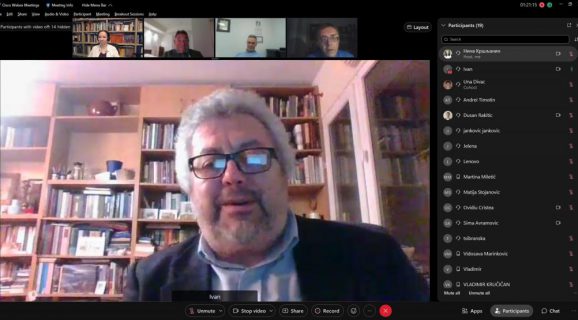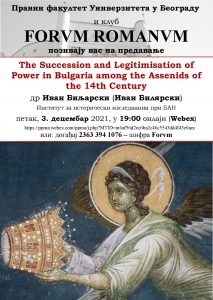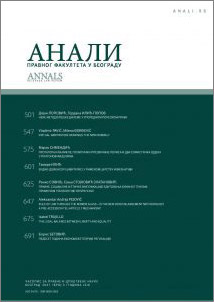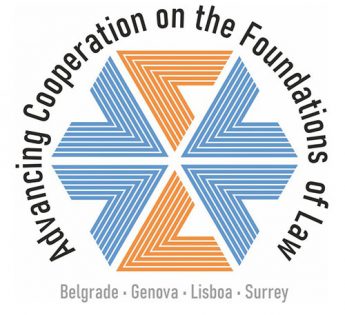
Forvm Romanvm: Dr Ivan Biljarski Gave a Lecture on the Legitimisation of Power in the Bulgarian Empire
 On Friday, the 3rd of December, 2021, the Forvm met again online to hear the lecture of Dr Ivan Biljarski (Иван Билярски) from the Institute for Historic Research of the Bulgarian Academy of Sciences, entitled „The Succession and Legitimisation of Power in Bulgaria among the Assenids of the 14th Century”. He spoke of the ideology of power in the Middle Ages – the combination of the ideas on hereditary monarchy and the will of God that does not depend on a person’s origin. He pointed out the significance of brothers in the Bulgarian hereditary order and spoke of the chaos that ensued after the assassination of Emperor Kaloyan, and of the approaches that were used to settle instances of throne vacancy and coups d’état. He then focused on the legitimisation of power of Emperor Ivan Alexander (who came into power after Ivan Shishman was deposed and exiled), which came through an election of sorts, or rather the confirmation of his power by the nobility. In spite of a complicated family situation (all of his sons bore the title of Emperor), since his times and up until Bulgaria fell under Ottoman rule, the throne was passed down from father to son. Births in the imperial family contributed to the charisma of the dynasty, although in Bulgaria, unlike in some of the neighbouring countries (Serbia included), the dynasty was never dubbed holy. Probably due to a stronger Rhomaian influence, the crown was considered as something granted by God alone, and biological origin was ideologically not essential (no matter how important it truly was in practice). As the basic characteristics of imperial charisma in Bulgaria, he pointed out corpus fratrum (the collective actions of brothers), primogeniture (rooted in the Old Testament and the story of Esau and Jacob), porphyrogeniture (translated as багрянородност) – that is, the succession of the first son born after his father’s accession to the throne, and the father’s choice (manifested in the title of Young Emperor, just like in Serbia). In the situations where there were no heirs to the throne, an election was organized; however, those cases were exceptional, and Bulgaria cannot be regarded as an elective monarchy. Finally, he pointed out that the 14th and 15th century were a time of agony for the Rhomaian-Balkan world, in the original sense of the word – a time dedicated to the struggle for survival, which influenced the practices of succession and legitimisation of power. An interesting discussion developed after the lecture – there was talk of the biblical examples used by the rulers, the reasons behind the deposition of Ivan Shishman, and the influence of the ideology of the medieval Bulgarian Empire on the modern state of Bulgaria after the liberation from Ottoman rule.
On Friday, the 3rd of December, 2021, the Forvm met again online to hear the lecture of Dr Ivan Biljarski (Иван Билярски) from the Institute for Historic Research of the Bulgarian Academy of Sciences, entitled „The Succession and Legitimisation of Power in Bulgaria among the Assenids of the 14th Century”. He spoke of the ideology of power in the Middle Ages – the combination of the ideas on hereditary monarchy and the will of God that does not depend on a person’s origin. He pointed out the significance of brothers in the Bulgarian hereditary order and spoke of the chaos that ensued after the assassination of Emperor Kaloyan, and of the approaches that were used to settle instances of throne vacancy and coups d’état. He then focused on the legitimisation of power of Emperor Ivan Alexander (who came into power after Ivan Shishman was deposed and exiled), which came through an election of sorts, or rather the confirmation of his power by the nobility. In spite of a complicated family situation (all of his sons bore the title of Emperor), since his times and up until Bulgaria fell under Ottoman rule, the throne was passed down from father to son. Births in the imperial family contributed to the charisma of the dynasty, although in Bulgaria, unlike in some of the neighbouring countries (Serbia included), the dynasty was never dubbed holy. Probably due to a stronger Rhomaian influence, the crown was considered as something granted by God alone, and biological origin was ideologically not essential (no matter how important it truly was in practice). As the basic characteristics of imperial charisma in Bulgaria, he pointed out corpus fratrum (the collective actions of brothers), primogeniture (rooted in the Old Testament and the story of Esau and Jacob), porphyrogeniture (translated as багрянородност) – that is, the succession of the first son born after his father’s accession to the throne, and the father’s choice (manifested in the title of Young Emperor, just like in Serbia). In the situations where there were no heirs to the throne, an election was organized; however, those cases were exceptional, and Bulgaria cannot be regarded as an elective monarchy. Finally, he pointed out that the 14th and 15th century were a time of agony for the Rhomaian-Balkan world, in the original sense of the word – a time dedicated to the struggle for survival, which influenced the practices of succession and legitimisation of power. An interesting discussion developed after the lecture – there was talk of the biblical examples used by the rulers, the reasons behind the deposition of Ivan Shishman, and the influence of the ideology of the medieval Bulgarian Empire on the modern state of Bulgaria after the liberation from Ottoman rule.





